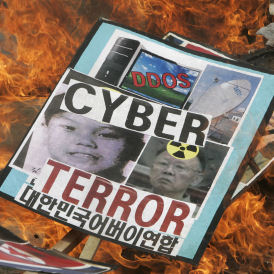‘Tens of thousands’ of cyber attacks every day
An adviser to the United States Department of Defense tells Channel 4 News there are “tens of thousands” of cyber attacks happening all the time – and they are getting more powerful.

In the last month, giants including the International Monetary Fund (IMF), Google Mail and huge security companies in the United States such as Lockheed Martin have all fallen prey to hackers.
The Chinese Government has admitted it has an elite unit of cyber warriors set up to protect China from attack, and the United States has drawn up a document suggesting it may now treat cyber attacks as an “act of war”.
So how seriously should the world be taking cyber warfare, the potential ultimate conclusion of cyber attack? Very, James Farwell, a defence consultant who has advised the US Department of Defense, told Channel 4 News.
“There are tens of thousands of attacks going on all the time. Some are more serious than others. But it’s evolving,” he said.
Germ warfare
Mr Farwell, speaking at the International Institute of Strategic Studies in London, said the best analogy for cyber warfare was like “germ warfare” and stressed that the world must stop considering it as a “more benign form of warfare” than traditional military action.
He said countries must put in place plans for retaliating against cyber attack, in part to deter attackers and also to prevent hasty action if major attacks do occur.
“It’s very easy to get into a war, but not so easy to get out of it. Look at Afghanistan,” he said.
He said the Stuxnet attack aimed at Iran’s nuclear facilities in 2010, which some believe set back Iran’s capability to produce nuclear weapons to 2015, posed huge questions for all nations.
“It was the first time a worm was used as a weapon,” he said.
Read more from Channel 4 News on cyber warfare by clicking on the image above
Not state-on-state warfare
Cyber warfare echoes terrorism in some ways because the perpetrator of an attack may not be a state, or even state-sponsored. It differs from cyber exploitation or espionage, because it does not involve taking information – instead, it means taking down systems, inserting malware or destroying technologies.
So far, the potential of cyber attack has not been fully realised – and nations have not, in turn, seen attacks on their systems as acts of force. But this could change if the attacks took down the banking system, a hospital, or made a plane crash, Mr Farwell said.
However, state retaliation for cyber attacks is incredibly difficult – and no nation has the answers yet, he said.
This is not a bunch of kids playing video games. They are developing technologies capable of enormous damage. James Farwell, defence consultant
Attribution is a problem, he said – finding out who attacked you using only an IP address or less. Nations also needed to work out whether it was justified to attack a nation harbouring an attacker, and how to ensure their response was proportional.
“If Peter threw a water bottle at me, can I take out a gun and shoot him?” asked Mr Farwell. These questions have to be asked of all warfare, but the waters are extremely muddy in the cyber world, he said.
Finally he said distinction also raised problems working out whether the hacker is a military or a civilian target.
“Nations need to show a threshold beyond which they will not sit back and take an attack. This clarity is likely to prevent attacks because they would know it could have physically destructive effects,” he said.
He said responding to cyber attacks was a “major challenge” as the capabilities of the hackers grew.
“In cyber attacks we have actors, some state-sponsored, some not, attacking states,” he said.
“But this is not a bunch of kids playing video games. They are developing industrial-grade technologies capable of enormous damage.”
